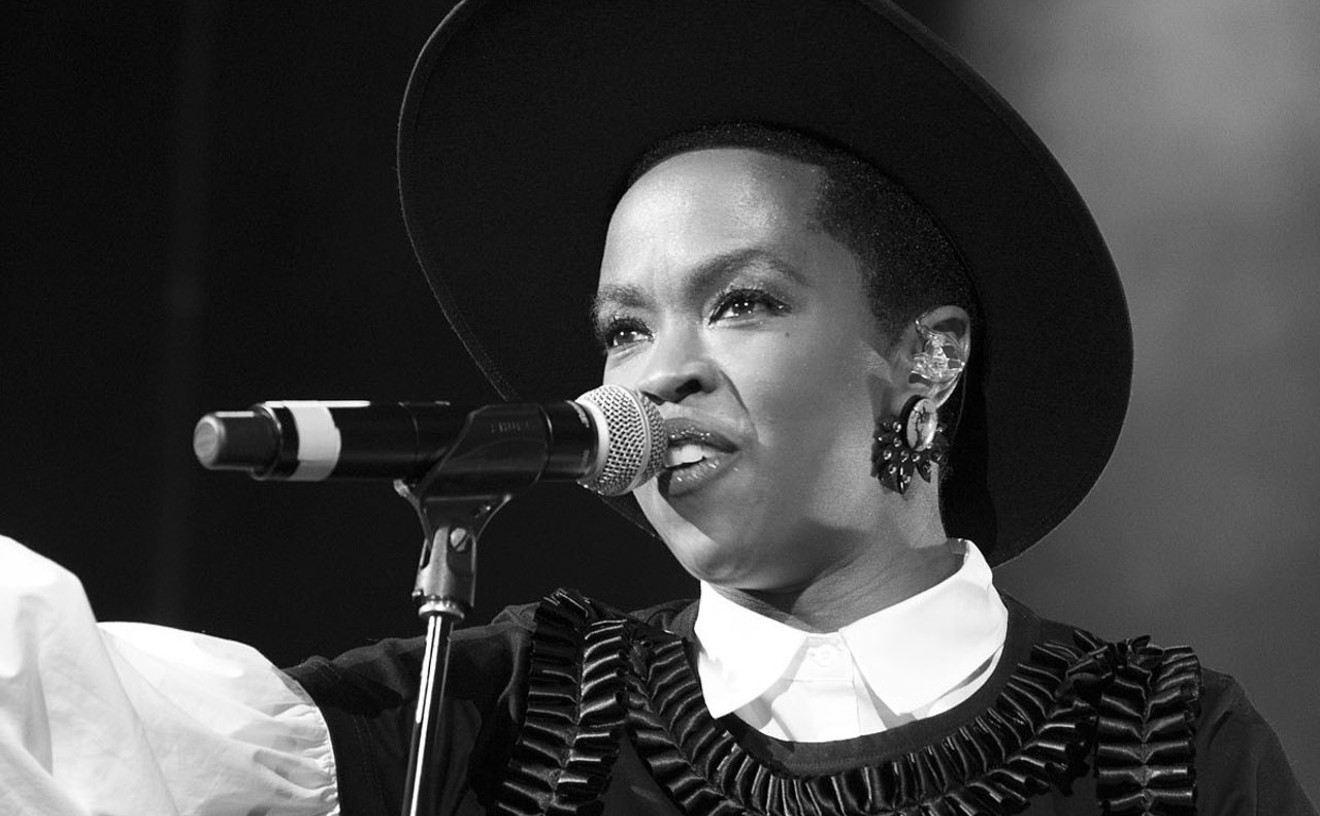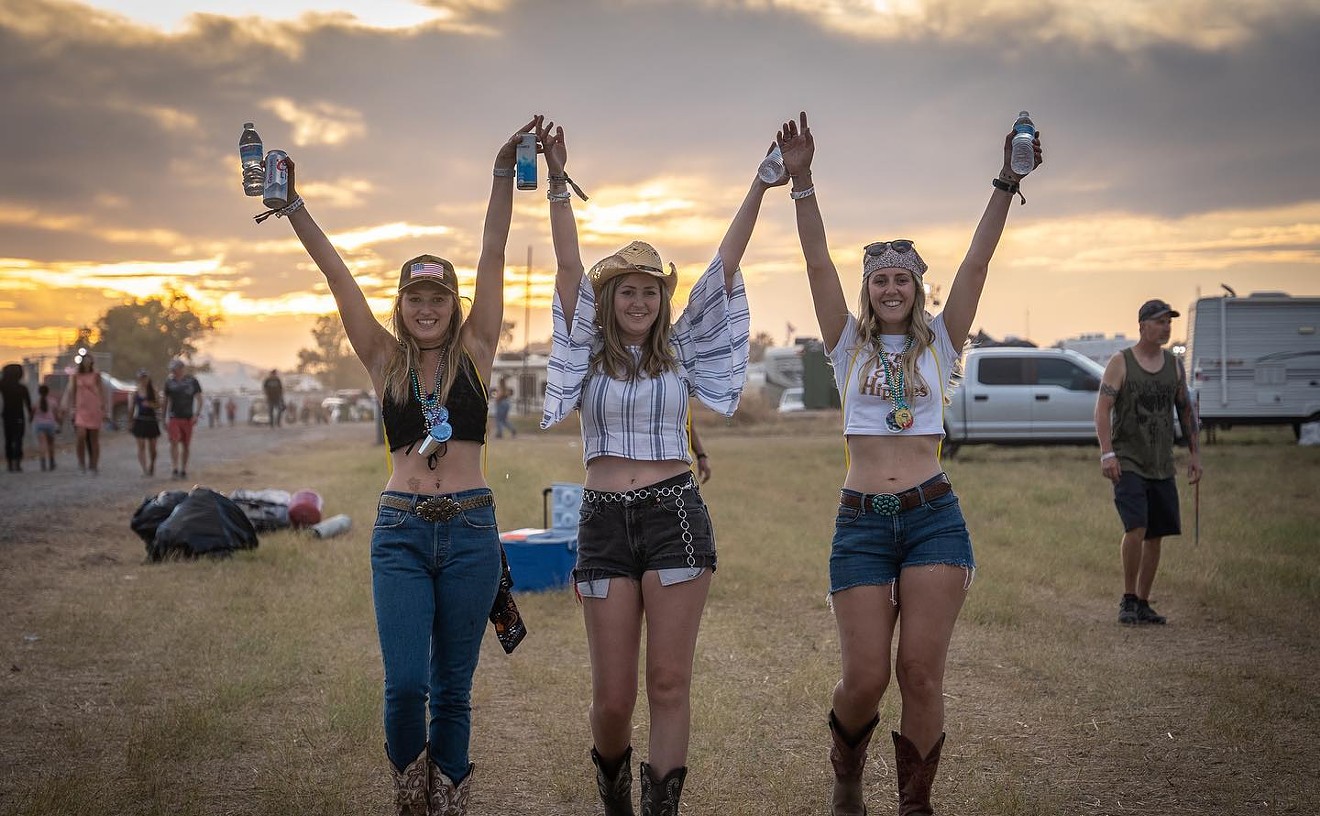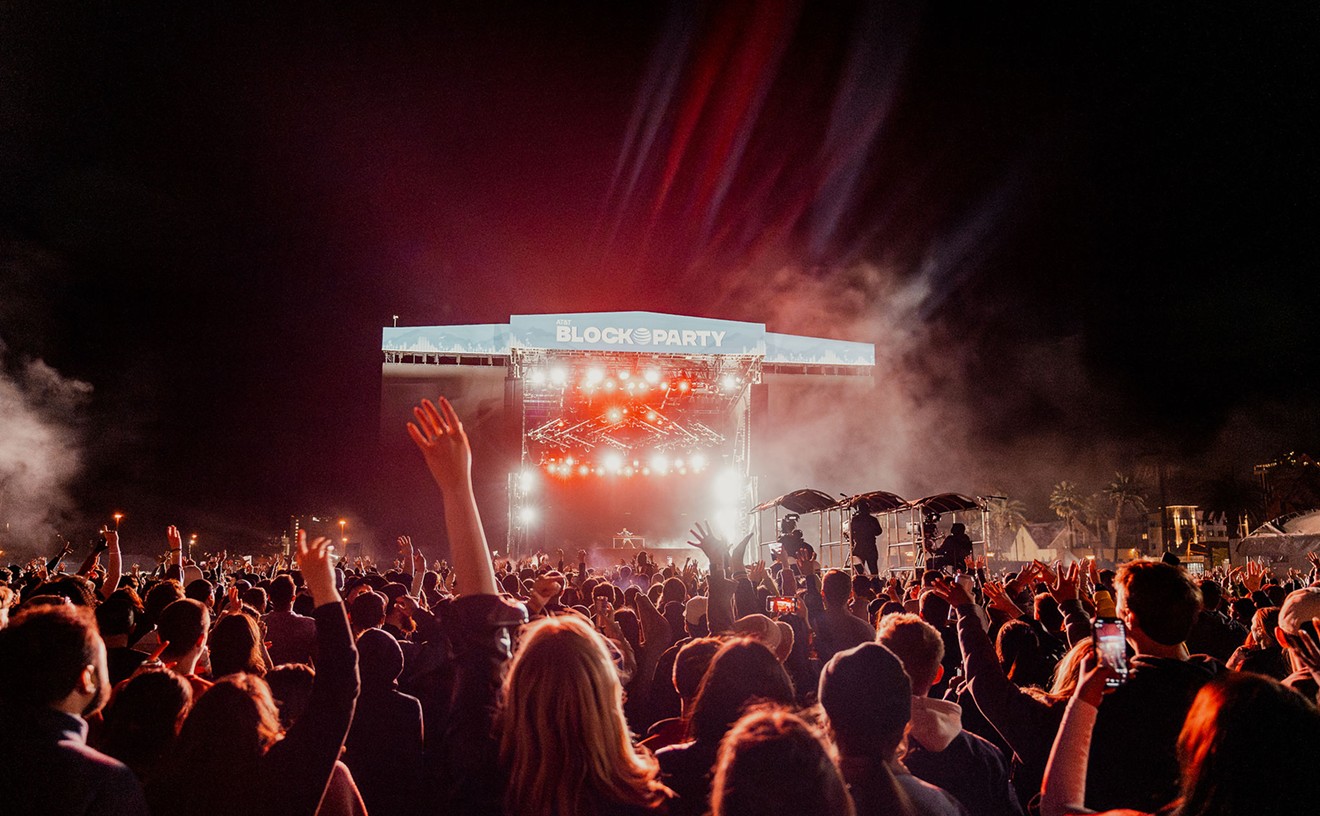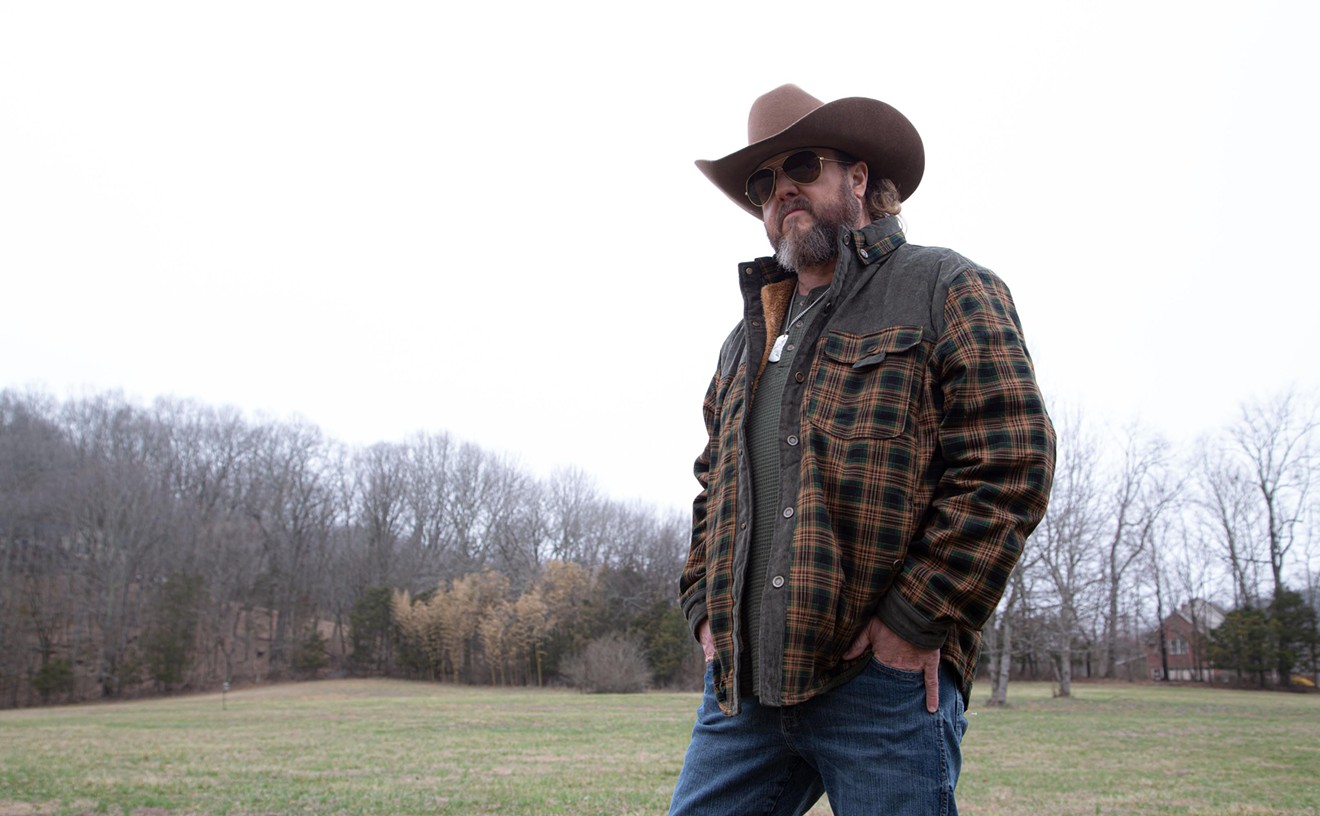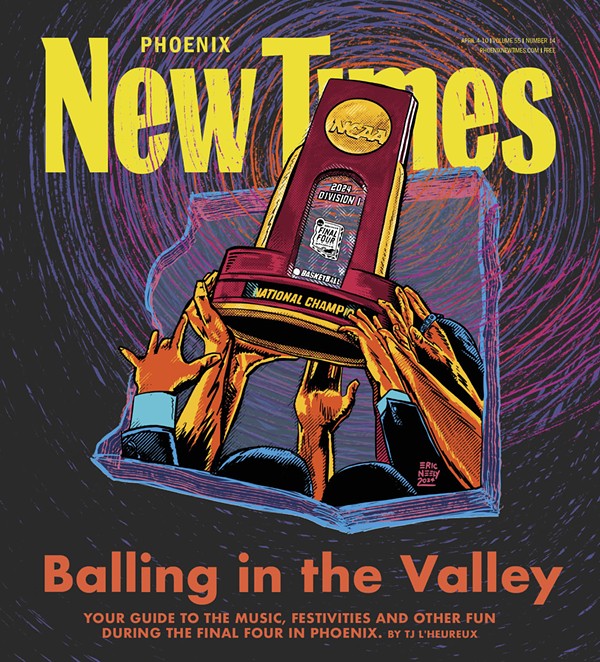The 2016 edition of New Times' Best of Phoenix is out now, featuring a series of essays that explore how our city's proximity to Mexico makes it better.
Para leer este ensayo en español, haga clic aquí.
That first time at Karamba, the thing I noticed was the conversations. When you go from hearing your language everywhere, all the time, to only hearing snippets sporadically, a single word can almost feel like home. It transports you.
“Güey, ¿me das una chela?” a guy asked the bartender near the entrance to the main room, and a certain calm overcame me. I was never a fan of güey, (a very Mexican word for “dude”), or, as a matter of fact, of the short, street version of cerveza, chela, but in that moment, it worked wonders. Suddenly, I too felt like having a chela.
Karamba, located on McDowell Road in central Phoenix, is a special kind of place. From the outside, it doesn’t look like much, with an old sign and a bad paint job. But the long line was my first clue I was in for a treat. The dance floor, always packed, is surrounded by red columns, giving the whole space a sort of glow. The stage, front and center, calls for attention, and that night, while Gloria Trevi’s “Todos me miran” was blaring in the background and a drag queen put on one hell of a show, I knew that in this, a very red state and my new home, I had found a place where I could finally be myself.
A club that caters to queer Latinxs.
That was the summer of 2011. In the years to come, friends back in Mexico would continuously ask me, “Why move to Arizona?”, and not someplace else, somewhere a bit more open where I could be myself. But I was there for school, and I wanted to stay put. By then, I was no stranger to backlash for my sexual orientation. I felt like after all I’d gone through, I could take on the world.
I attended high school in a city called Morelia, in central Mexico. Although the capital of the state, Morelia has always felt like a big little town. A beautiful colonial city, Catholicism is found everywhere, including in schools. My mother, bless her heart, had always fought to keep us from nuns and their hard rulers, so my brothers and I attended progressive schools. My high school was tiny, a single house downtown that desperately needed some maintenance work. My graduating class was 16 students. It was the strange, liberal school in town, and I loved it. By the time I was supposed to start my senior year, however, things had changed.
Kissing was allowed, I suppose, as long as you were straight.
But for me, PDA meant being expelled.
“We need to re-evaluate you being able to attend next year,” the principal told me. He had always been nice enough to me, so it hit me like a ton of bricks. I didn’t understand what was happening, and I certainly didn’t know where to turn. Scared, I avoided telling my parents for weeks. When I finally did, they were livid at the principal. They marched into the school and stood by me. They understood better than me what was happening: I was being expelled for being unapologetic about who I was; I was being expelled for being gay, and for being out. Fearful of a discrimination lawsuit, the school finally relented. I was back the next year, but certainly uncomfortable in my own skin.
Since then, those eyes have never left. By the time I moved to the U.S., it felt like I would no longer mind to have them on me. But not all cities are created equal, and Phoenix is definitely another story.
Today, back in Morelia, it does feel like things have changed. It’s no Mexico City, where gay couples walk hand-in-hand on the street tall and proud, but there’s definite progress. Gay clubs have popped up left and right, and although, per usual, they are geared toward gay men, these clubs are wonderful bubbles that by now feel more just like fun and less like a desperate escape.
Months before my first visit to Karamba, on the very same afternoon I
“Classes are not practical. How can we learn if we never write?” I remember thinking. And, “Maybe journalism just isn’t for me.” My mother, who by then was already a Phoenician, had invited me to stay, so I jumped on the opportunity to get away.
Just a few weeks later, I got my letter of acceptance to the Walter Cronkite School of Journalism and Mass Communication. Here, finally, was my brand-new start. I was supposed to begin in the spring semester of 2011, a wide-eyed freshman reading, speaking, and writing academically in English for the very first time.
And then there was a legal snag. I would eventually have to wait another six months.
There was this part of me that didn’t want to go home, almost like the spell would break if I flew back to Mexico. I knew it was irrational, and probably impossible to avoid, but I figured I might as well find out, so I visited an immigration lawyer who said, yes, of
Turns out, she was completely wrong. Months passed, and with January looming, my promised visa was nowhere to be found. Now, I know I could have waited forever, and it still wouldn’t have arrived.
Finally, just a few days before classes were set to begin, I asked for an appointment with my adviser at ASU’s International Students and Scholars Center. I still remember sitting in his office, in an uncomfortable chair, looking at this man but focusing only on his double chin, barely able to register a word he was saying. In that moment, as he stared at me through barely-open eyes, he was the most intimidating sight I’d ever witnessed. He held the power, and he knew it.
Thoughts were flying quickly through my head: I had no idea what the future held, but I was sure that the next few minutes would be decisive. My first guess was that “adviser” was more of a trivial title than an actual thing, because if he gave me any advice or words of encouragement, I certainly missed them.
For the first few minutes, he told me how lucky I was to be a foreigner studying in the U.S. Then he moved on to explain how my acceptance was hanging by a thread and finally how I was never going to make it as a Sun Devil if I didn’t correct course — yesterday.
By then, the head of the office had come into the room, and I guess looked at my face, so she promptly told me that no, in fact, I was already a Sun Devil, but I should go back to Mexico, get the visa, and come back and try in the summer.
Grateful the conversation was over, I left in a hurry.
That summer, unbearable heat around me and student visa in hand, I happened upon Karamba. A few weeks before, a guy I met while doing some paperwork for school offered to come with me to check out one of the few lesbian bars in town at the time. The place was packed, and it was going well until he went home without a word after one too many drinks.
I was left alone by the bar; Claudia and Mona, a couple from Sinaloa, took pity on me. They were going home, but offered to show me around town any other night, if I needed it. Embarrassed by my transparent cluelessness, I saved Claudia’s number and figured I would never use it.
Still friendless some time later, I decided to attend a mixer for international students. After some awkward conversation that was going nowhere, and a couple of cold slices of pizza, I suddenly remembered Claudia’s number in my pocket, and decided to take a chance. That very same night, I was partying at Karamba. It was the first of many nights spent at clubs specifically targeted at queer Latinxs.
In the aftermath of legislation such as SB 1070, which allowed authorities to ask for immigration papers without cause, and which many detractors accused of spurring racial profiling, and long before same-sex marriage was even considered a possibility in Arizona, these nights felt like
In Mexico, I was a gay woman. Now in Phoenix, I was a Mexican gay woman. This held more weight than I could have realized before then, and it would shape not only my
The idea of intersectionality had never before crossed my mind, but now I understood the importance of it. The first time I heard about the club, I remember thinking, “Is this too specific? Can they really cater to those who are both Hispanic and identify as LGBTQ?”
Then, with all those people dancing around me, yelling out the lyrics, holding tight and kissing under strobe lights, I finally understood what people meant when they talked about a safe space.
Even now, it seems difficult to describe the experience. There is a certain kind of valor in places such as these — not just the valor it takes to get there, but the one you take from it. Inside these walls, a community grows stronger, and you do with it as well.
In central Phoenix, two main gay Latino clubs operate — Charlie’s and Karamba. Both offer patrons to-die-for tacos just outside the door, and both proudly stand
The situation for LGBT
In 2013, the National Coalition of Anti-Violence Programs, a national organization fighting violence against the LGBT community, found that, when compared to white counterparts, people of color who identify as LGBT are almost twice as likely to experience physical violence. The same organization, in a 2014 report, found that 15 percent of all anti-LGBT homicides had
For queer people of color, intersectionality is important, particularly in the face of violence. Often, it’s not about
As it works out most times, college is a liberal bubble. None of my friends ever batted an eye when I told them I was gay, and that certainly made things easy. Outside school, things were different. Who I was, was a dangerous combination, but places such as Karamba gave me the courage to overcome many fears.
That first summer, I met many others who regularly went to these places. “There’s this feeling of belonging, right here in the middle of this dance floor,” a friend once told me. He was referring to how difficult it could be to be a gay man in Arizona, and to be an immigrant. And that being both at the same time sometimes felt impossible. I knew exactly what he meant.
I moved away from Phoenix two years ago, and it’s been even longer since I’ve spent a night at Karamba or Charlie’s, but I can still remember how it felt then to dance the night away without worrying about what the world would think of our community the following day. Even today (or perhaps today more than ever), when same-sex marriage is legal nationwide, and there is a push toward awareness and inclusiveness, places like these remain vital. A sanctuary. A fortress guarding you from racial epithets and homophobic slurs. A home.
Born and raised in Mexico, Dulce Paloma Baltazar Pedraza moved to the U.S. to attend the Walter Cronkite School of Journalism at Arizona State University, where she served as the news editor of the student-run media organization The State Press. Her work has appeared in Talking Points Memo and Fusion, among others.





